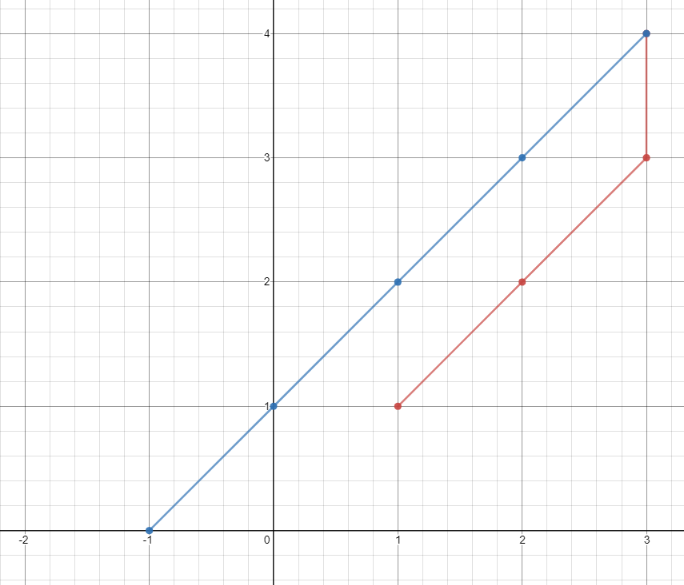Welcome to Subscribe On Youtube
1266. Minimum Time Visiting All Points
Description
On a 2D plane, there are n points with integer coordinates points[i] = [xi, yi]. Return the minimum time in seconds to visit all the points in the order given by points.
You can move according to these rules:
- In
1second, you can either:- move vertically by one unit,
- move horizontally by one unit, or
- move diagonally
sqrt(2)units (in other words, move one unit vertically then one unit horizontally in1second).
- You have to visit the points in the same order as they appear in the array.
- You are allowed to pass through points that appear later in the order, but these do not count as visits.
Example 1:

Input: points = [[1,1],[3,4],[-1,0]] Output: 7 Explanation: One optimal path is [1,1] -> [2,2] -> [3,3] -> [3,4] -> [2,3] -> [1,2] -> [0,1] -> [-1,0] Time from [1,1] to [3,4] = 3 seconds Time from [3,4] to [-1,0] = 4 seconds Total time = 7 seconds
Example 2:
Input: points = [[3,2],[-2,2]] Output: 5
Constraints:
points.length == n1 <= n <= 100points[i].length == 2-1000 <= points[i][0], points[i][1] <= 1000
Solutions
Solution 1: Simulation
| For two points $p1=(x_1, y_1)$ and $p2=(x_2, y_2)$, the distances moved in the x-axis and y-axis are $dx = | x_1 - x_2 | $ and $dy = | y_1 - y_2 | $ respectively. |
If $dx \ge dy$, move along the diagonal for $dy$ steps, then move horizontally for $dx - dy$ steps. If $dx < dy$, move along the diagonal for $dx$ steps, then move vertically for $dy - dx$ steps. Therefore, the minimum distance between the two points is $max(dx, dy)$.
We can iterate through all pairs of points, calculate the minimum distance between each pair of points, and then sum them up.
The time complexity is $O(n)$, where $n$ is the number of points. The space complexity is $O(1)$.
-
class Solution { public int minTimeToVisitAllPoints(int[][] points) { int ans = 0; for (int i = 1; i < points.length; ++i) { int dx = Math.abs(points[i][0] - points[i - 1][0]); int dy = Math.abs(points[i][1] - points[i - 1][1]); ans += Math.max(dx, dy); } return ans; } } -
class Solution { public: int minTimeToVisitAllPoints(vector<vector<int>>& points) { int ans = 0; for (int i = 1; i < points.size(); ++i) { int dx = abs(points[i][0] - points[i - 1][0]); int dy = abs(points[i][1] - points[i - 1][1]); ans += max(dx, dy); } return ans; } }; -
class Solution: def minTimeToVisitAllPoints(self, points: List[List[int]]) -> int: return sum( max(abs(p1[0] - p2[0]), abs(p1[1] - p2[1])) for p1, p2 in pairwise(points) ) -
func minTimeToVisitAllPoints(points [][]int) (ans int) { for i, p := range points[1:] { dx := abs(p[0] - points[i][0]) dy := abs(p[1] - points[i][1]) ans += max(dx, dy) } return } func abs(x int) int { if x < 0 { return -x } return x } -
function minTimeToVisitAllPoints(points: number[][]): number { let ans = 0; for (let i = 1; i < points.length; i++) { let dx = Math.abs(points[i][0] - points[i - 1][0]), dy = Math.abs(points[i][1] - points[i - 1][1]); ans += Math.max(dx, dy); } return ans; } -
impl Solution { pub fn min_time_to_visit_all_points(points: Vec<Vec<i32>>) -> i32 { let n = points.len(); let mut ans = 0; for i in 1..n { let x = (points[i - 1][0] - points[i][0]).abs(); let y = (points[i - 1][1] - points[i][1]).abs(); ans += x.max(y); } ans } }